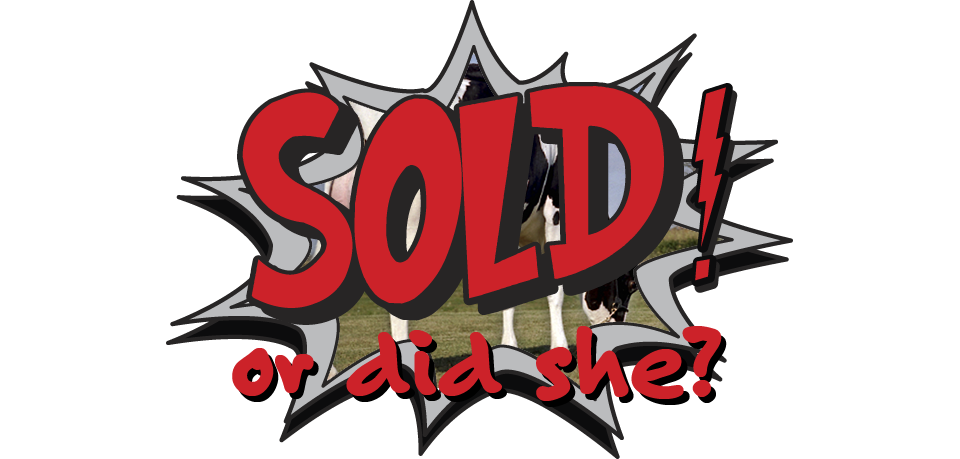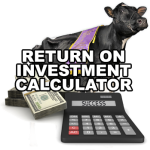Maybe it because it’s Friday the 13, or maybe it’s because I just like stirring things up, but recently when I was reviewing the sale list from some of the major sales, I found myself asking, “Did she really sell?”
As I look at the buyers list I see that there were many lots that were bought either by sales management or by the close friends of the person selling the animal. While I understand in some cases, such as Rocky Mountain Holsteins, for example, that the teams putting on the sale are also typical buyers as well, I also notice cases where I see that lots sold to a close friend of the consignor or neighbor of the consignor and I ask myself did she really sell?
It has been my finding in the past that these types of sales, typically, do not result in any form of actual sale. Ya sure you may see the new name on the pedigree for a little while, but give it about a year or so and that animal is back in the sole ownership of the breeder who was selling that animal.
I can understand that the breeder does not want to let their animal sell for less than they feel they are worth. However, the question begs to be asked, is she really worth what they think she is? On the other hand, are they just looking for the marketing aspect of having one of their animals on the top sellers’ list?
Creating a False Market
There is a certain aspect to having your animal appear on the top sellers list at a major sale. Often time perception is reality. Therefore, if breeders see family members from a certain family consistently selling well, they assume it’s a very marketable family and then want to get in on that family to cash in on the popularity. The problem is that popularity never existed and the person buying in never makes any money. Neither does the original seller really. Since they have to pay the commission to the original sales management team for the commission on the animal that never really sold.
Don’t believe your own hype
For most dairy breeders, nothing compares to seeing the fruits of your hard work. You tend to see each as though it was one of your children. Well not quite, but pretty close. You have put so much hard work into it that you want to see the reward for all that work. Many times that comes in one of two ways: awards and/or revenue. Moreover, while awards are nice, they don’t pay the bills. Therefore, you do not want to let those animals go for less than you feel your time and effort is worth.
The problem is many breeders start getting a false sense of what their animals are worth. You see other animals selling for big dollars, and you think, “Hey my heifer is at least as good as that heifer, if not better”. Since you don’t want to be shortchanged on your sale price you “protect” her by having a friend or neighbor run up the sale price to what you believe is the minimally acceptable price. The problem is that no one else in the market feels that she is worth that, so all that you have really done is increased the size of the commission check you are going to pay to sales management.
There’s a fix in the works
I cannot tell you the number of times that I could tell you who and at what price an animal would sell for, before the sale even started. The reason I can’t tell you is because it’s against most terms and conditions of the sale agreement. Animals being offered at public auction are to be sold in an open and equally available manner. Often times, high valued animals are going through the sale ring for the marketability and the hype. Yes, they are being sold to a new buyer, but the deal has already been worked out before the heifer ever enters the sale ring.
Can I say it’s wrong. Not really, because it is a mutually agreed upon sale price, and if someone else wanted to pay more than that price they could. The challenge is that this was more of a private treaty sale than a public offering. However, I guess everyone wins, sales management gets a sale topper, the seller gets the sale price they are looking for, and the buyer pays a price they agreed upon and gets the added promotion on the animal.
The Bullvine Bottom Line
If you are going to sell an animal at public auction, be willing to sell her. Don’t put her (or in many cases now him) in the sale if you are not willing to sell. Yes, I understand the marketing aspects, but in the end, you are only hurting yourself and the industry. Those who have been to enough of these sales know what breeders are actually willing to let their top animal go, and those who only have the animal in the sale for the hype. Next time you are at one of these top sales, look to see who is bidding on these animals. Is it the people who buy all the time? Is it a breeder who you know is looking to add a new cow family? On the other hand, is it the neighbor or best friend of the person selling the animal? When the latter is the case, I have made it a point to stop bidding that instant. No matter what the price.
What has your experience been? Please share in comments box below.
Not sure how much to spend on that great 2 year old?
Want to make sure you are investing your money wisely?
Download our Dairy Cow Investment Calculator.



















In fact I tend to disagree. Many top Animals have changed hands in public option and having put up the money ourselves, it has turned into actual sales later on. Being honest and being smart and business oriented makes the industry interesting. BIG
Thanks Alan for your comments.
I totally see what you are saying. And I would say the majority of the time you are correct. It is also why I have a lot of respect for people like you, or the TAG team for the way you run things. But there are times that I have 1st hand knowledge of that the animal went through the sale ring, had 1 name added to the pedigree, to only have that name removed about a year later.
In the dairy industry it is very true when people say you only have your name, so don’t do anything to tarnish that.
Andrew
Good to see article. This has gone on for years. Especially now with all the bull of the minute high genomic crap that sells. Am not just saying the genomic market either. Got another one of these fantasy sale coming up beginning of August, already heard what several of them are going to bring. Will be the highest avrg sale to date. Always seems to be same handful of names appear as buyer or new syndicate name.These people are bad for the industry and that is why the commercial dairymen laugh at the registered industry. It is a joke and gets worse every year!
There are several venues to be able to sell (or not sell) an animal in today’s market place while protecting the price. There are multiple on-line auctions that have minimum bids to protect the price of embryos, choices and live animals while still being able to capture the top dollar. There are also live sales that are doing the same thing are more and more sale managers that are offering the service. With there being so many of this type of sale as an option, I think it makes no sense to put an animal in a sale and then buy her back because she didn’t bring enough. It may be splitting hairs but I think it looks much worse to buy your own animal back than it does to consign an animal to a min bid type sale and have her not sell.
Matt
Most people are aware of what is going on at some of these sales. With that being said, the only people I think those sales really hurt are new-comers to the industry who may not be as informed (Reminded me of a few weeks ago buyer beware article). A fringe positive of those sale/nonsales would be for breeders who are already in those cow families and have stuff ready to sell right after the big sticker shock.